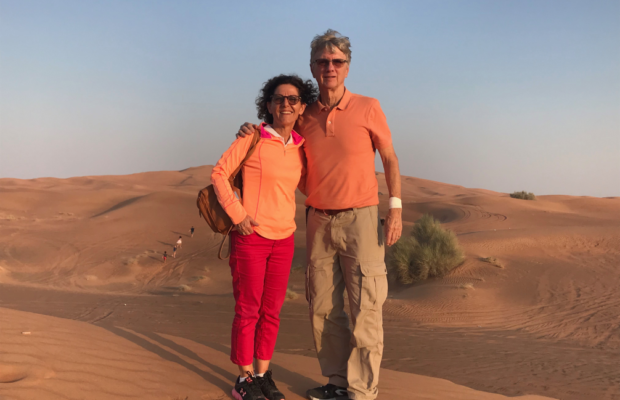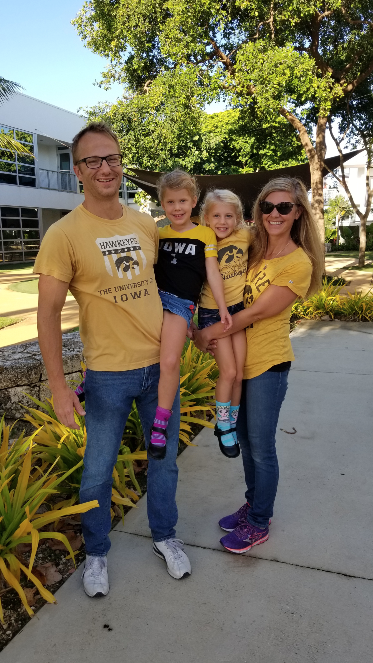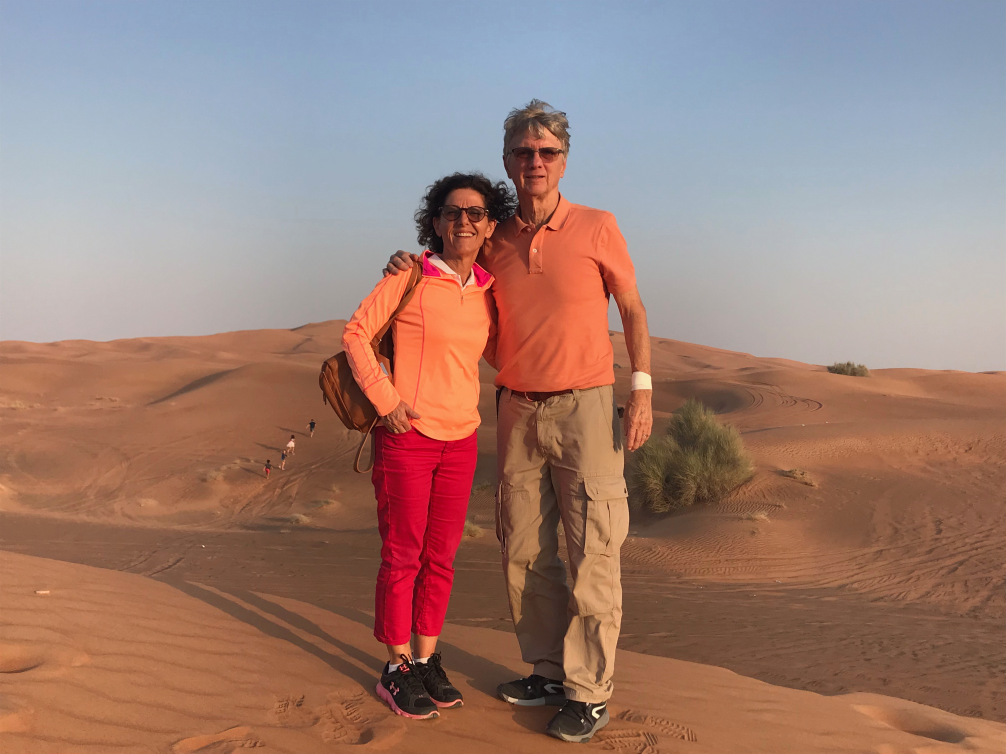Opportunities Overseas | Teachers develop rich life lessons from international experiences

Venturing beyond our little town, some of CFHS’s own have explored different parts of the world while teaching abroad. In the top photo, John and Patricia Black explored and posed in the desert in Dubai, United Arab Emirates during their time teaching there. In the middle photo, Jeff Hartman stands as the center of attention at the prom for the school he taught at in Bangkok, Thailand. To the right, Chad Van Cleve and his family sported their Iowa Hawkeye gear in the Cayman Islands for a dress up day where they had to represent where they came from. Van Cleve is still teaching in the Cayman Islands today.
John and Patricia Black –
American School of Dubai
Q: What are the differences between teaching in the US vs where you were teaching?
John: I was what is called a trailing spouse, thus I could not be a full time teacher, so during this time I was a sub in classes ranging from Arabic language studies, biology to vocal music. My responsibilities ranged from sixth grade to 12th grade. This is very similar as to what I do in Cedar Falls. I found the students to be also similar to those here.
Patricia: The student population was international and so was the staff. International schools budgets are bigger. That allowed for more possibilities in terms of resources, professional development, salaries and opportunities in general. People are the same wherever you are in the world. They want to be respected, understood, cared for. They want to do well, and it is true of students, staff and administration.
Q: What are the differences in lifestyle/culture in the United States vs. where you were teaching?
John: The students in Dubai have had great opportunities to travel because of their parents’ jobs and the programs that the school offers that allow the students to travel to four different continents. Students there did not drive and had either a hired driver, parents or Uber take them to and from school and to events around the city.
The students acted like typical students although they might speak two or three different languages. English though was the spoken language both at school and in the city. Only 15 percent of the residents are Emirates, with the balance of the population being Americans, Canadians, Europeans, Indians or Pakistanis.
Patricia: Dubai is a multicultural Arab city where people of different ethnic backgrounds, economic status, professions and languages coexist, live and grow peacefully.
Q: What impact did teaching overseas make in your personal life and your professional life? Were there any big changes you noticed?
John: Professionally, I did not feel I grew that much in Dubai since I was not involved in any professional development programs or trips the school offered. Personally, through meeting people from all over the world and traveling extensively in the Middle East, my knowledge of many things culturally and politically grew a lot.
Patricia: When you teach abroad, you become exposed to a wealth of new experiences in every possible level, so the change becomes inevitable. Hopefully we use it to grow as a human being and as a professional too. It also provides a good dose of humility since it confronts you with your own limitations.
Q: What was your favorite part of teaching overseas?
John: Definitely traveling to places like Oman, Jordan, Egypt, Jerusalem, Spain and the UAE was a chance of a lifetime. That was a very big learning experience for me personally. Plus, sharing my U.S. experiences with the students was enjoyable.
Patricia: Travelling, learning and meeting people of many different walks of life. It touches you heart and your senses.
Q: How have your perceptions changed or what lessons have you learned on a global scale? How do you see the world now vs. how you saw it before teaching overseas?
John: I found people to be the same regardless of where you were. Oman was a very mysterious, and I have to admit a place where I was a little afraid to travel to, but I found the people there to be very nice, friendly and helpful regardless of the language and religious differences. Egypt, Jordan and Jerusalem were fantastic with the amount of history I learned.
Patricia: So many that I wouldn’t know where to start. Let’s just say that you rediscover that the world is so big yet so small. You shouldn’t have your fate determined by your place of birth, and there is so much we can do with a little more kindness.
Jeff Hartman –
American School of Bangkok
Q: What are the differences between teaching in the United States vs. where you were teaching?
A: The curriculum was a U.S. curriculum, so that was similar. One difference was that we were on a block schedule, so classes met for 80 minutes every other day. The school was a K-12 school, so I enjoyed seeing the elementary and middle school kids around the campus. The school was much smaller with only 40 – 50 students in each grade, and we had smaller class sizes, so I really got to know my students better than here at CFHS.
My students were very respectful and appreciative. Most of my students thanked me as they left class every single day. At our school all the students call their teachers by their first name, so I was Mr Jeff. At first it seemed strange, but I got used to it because when I came back here it seemed strange being called Mr Hartman.
Q: What are the differences in lifestyle/culture in the United States vs. where you were teaching?
A: Manners and respect are very important in Thai culture. When you greet people, you put your hands together and do a slight bow called a “wai.”
One of the things that always amazed me about Thailand is drivers don’t honk their horns in anger. Bangkok traffic is terrible, and it’s common to have people cut in front of you, but people don’t honk. It is considered bad manners, and the person who loses their temper, loses face. Other places we traveled such as Egypt and Vietnam was the opposite. Those drivers continually honked their horns.
Q: What impact did teaching overseas make in your personal life and your professional life? Were there any big changes you noticed?
A: Professionally, I have a much better understanding of what it’s like for students who are English Language Learners.
On a personal level, my life has been changed by how much traveling we did in two years. My wife and I want to continue to travel and see as much of the world as we can. We also lead a much simpler life in Thailand, and we both hope to continue to simplify our life back here in the United States. We didn’t seem as busy there, and we got by on a lot fewer possessions.
Q: What was your favorite part of teaching overseas?
A: My two favorite things about teaching overseas were the friendships we made and all the traveling we did. A couple of my favorite trips were to Nepal, Cambodia, Vietnam and Egypt. Traveling to Cambodia was relatively cheap and easy, and I liked it so much I went there four times over two years. Trekking in the Himalayas and cruising down the Nile were two things that I never dreamed I would actually do.
Q: How have your perceptions changed or what lessons have you learned on a global scale? How do you see the world now vs. how you saw it before teaching overseas?
A: Between our travels and the international friends we made in Bangkok, I think I do have a more global perspective on many social and political topics. When I read about international events, I pay closer attention and see it on a more personal level.
For example, I have a friend who is in his second year at an international school in Hong Kong, so I have a personal connection when I read about the rioting going on in Hong Kong. The Halal chef at ASB is a wonderful man who is a refugee from Syria, so when I read about closing our borders to refugees or read about the war in Syria, I now have a personal connection.
Last Easter, we were in Sri Lanka when the churches and hotels were bombed. Over 300 people were killed, and we drove by one of the churches 30 minutes before the bombs went off. I don’t know how many people in the U.S. were even aware of the attacks.
A controversial issue in the U.S. is what to do about gun violence. My friends from other countries don’t understand why we allow people to have all the guns that we do. They have strict gun control laws, and they don’t have the problems we have here.
The students in my environmental science class were amazed that the U.S. government is rolling back many environmental protection laws that help ensure clean water, clean air and the survival of endangered species. Many of my students come from countries such as Thailand, India and China where air and water pollution is a big problem that their countries are trying to get under control, and they see the U.S. going in the wrong direction.
Chad Van Cleve –
Cayman International School
Q: What are the differences between teaching in the U.S. vs. where you are now?
A: The differences are not all that different. At CIS we don’t have AP courses. We have IB, but the programs are similar in many ways.
The school is kindergarten to grade 12, so we have more interaction between students of all ages. Older students help younger students a lot. Sports are not as important as for school spirit. Students play other schools on the island and travel to other countries, but there is not as much fuss about games.
I think the diversity of the student population is greater here than in Cedar Falls, but attitudes and behaviors are similar. CIS is a private school and has a dress code, but that is a requirement for all schools on the island whether they are private or public. My two daughters who are now in first grade are learning Spanish in school.
Q: What are the differences in lifestyle/culture in the U.S. vs. where you are now?
A: I have to drive on the opposite side of the road. I currently live less than 100 yards from a beach that can be used almost every day of the year. I swim and dive every week if not almost every day.
We celebrated Pirates week last week, and then the island started to prepare for Santa. There is a strong mixture of British, U.S., Cayman and Jamaican culture. The Cayman Islands are former British territories, and the two nations are still well connected.
English is the main language, but there are many people from all over the world, so hearing languages other than English is common.
Life is more relaxed here and ensuring you have a good quality of life is important to people. You have to take time to relax and feed your soul.
The island produced very little in the form of goods, so everything must be shipped to the islands. This means we do not have access to a lot of things or if you see something you want you have to buy it then; otherwise, it might not be there when you go back.
Q: What impact has teaching overseas made in your personal life and your professional life? Are there any big changes you’ve noticed?
A: I have had the opportunity to meet people from all over the world and interact with people who have great stories. They continue to open my eyes to perspectives on why the world is the way it is.
Professionally, I have grown quite a bit. I have had the opportunity to work on projects with students that get them out of the classroom and apply their understanding to real world events. This is something I hope to be able to continue to do as a teacher no matter where I teach.
Q: What has been your favorite part of teaching overseas?
A: For this overseas teaching position, the quality of life has been great. I have had opportunities to scuba dive weekly. I have access to beautiful beaches that my family and I can explore on a whim. Eighty one degrees fahrenheit and sunny is an almost everyday occurrence.
Q: How have your perceptions changed or what lessons have you learned on a global scale? How do you see the world now vs how you saw it before teaching overseas?
A: I see the impact of large nations such as the U.S. on other nations. I see how resources need to be managed differently in the U.S. than in other places and that the U.S. should not judge other nations for not doing things the “Americnan Way.”
Professionally, I am a better teacher. I have been exposed to different teaching methods and philosophies, which I can add to my past experiences to be more competent as a teacher.
All of this helps me to view the world as a place where people need to travel and interact with others in order to develop a better understanding of the world.












You must be logged in to post a comment Login